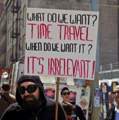English reported speech?
Ich wollte nur wissen, ob das richtig ist.
Und kann mir bitte jemand die Regeln erklären?

2 Antworten

Hallo,
du hast leider einige Fehler gemacht. Die wichtigste Regel, die du dir merken solltest, lautet: Wandle bei einer zusammengesetzten Verbform nur das erste Verb um!
Dabei gilt: Mache aus jeder Present-Form ein Past und aus einem Past ein Past Perfect (... es sei denn, es ist durch Zeitangaben klar, dass sich die Verbform auf etwas Vergangenes bezieht oder dass es sich um ein Past in einer if-clause handelt).
Aus "didn't + infinitve" wird dabei "hadn't + dritte Form (past participle)".
Unverändert bleiben: would, could, should, might, used to und had better. Außerdem darfst du in der Regel "mustn't" und "needn't" übernehmen. Drückt "must" eine logische Schlussfolgerung aus, bliebt es ebenfalls unverändert!
Past-Formen in Nebensätzen bleiben in der Regel unverändert!
Merke dir außerdem: Füllwörter wie "really" darfst du in der reported speech weglassen.
Außerdem musst du Zeit- und Ortsangaben relativieren, wenn das Gesagte nicht am selben Tag oder am selben Ort wiedergegeben wird. Vermutlich wird dein*e Lehrer*in erwarten, dass du aus "today" "that day", aus "tomorrow" "the next/following day" und aus "yesterday" "the day before/the previous day" machst.
Du hast sehr oft Infinitive - die immer Infinitive bleiben! - fälschlicherweise für Present-Formen gehalten und ins Past gesetzt, was aber keinen Sinn ergibt. Das siehst du z.B. in "He said ... that we had to went..." Das würde bedeuten "Er sagte, dass wir gingen (!!) mussten." Ich hoffe, du merkst, dass das falsch ist.
Hier die korrekten Lösungen:
Our teacher told us that New York had always played an important role in American history and that in the 19th century it had been the way in to America for immigrants from Europe.
Our tour guide told us that, if we ever felt we needed time to relax, we should/were to go to Central Park where we could sit and enjoy an ice cream.
She said (that) she (had) visited NYC last year (oder: the year before) and had eaten/ate the best hot dog she had ever tasted.
Sully told the air controller they wouldn't be able to reach runway 1 at Teterboro, so they would have to land on the Hudson River.
Jefferey Skiles said that no one had ever succeeded in landing a large plane like that on water before.
Harry said that he had been (auch: went) to the Guggenheim museum the day before and that it had been so interesting that he had to go back again the next/following day.
Hoffe, das hilft dir weiter.
LG

Ja, da aber das "must" des tour guide wohl eher als dringende Empfehlung zu sehen ist, habe ich hier "should" als Alternative vorgeschlagen. Neben "had to" kannst du aus "must" auch "was/were to" machen. LG



Hallo,
das Prinzip des Backshift of Tense scheinst du verstanden zu haben. Allerdings ändern sich nicht nur die Zeiten. Außerdem folgt hinter modalen Hilfsverben der Infinitive!
had to went, could sat, would had, ... gibt es nicht.
Ob in der indirect speech (= reported speech) ein Backshift gemacht werden muss, ist abhängig von der Zeit im Einleitungssatz.
steht das Verb im Einleitungssatz im Present, Present Perfect oder Future (say, tell, remark, explain ... ) ändern sich die Zeiten nicht.
Beispiel :
She says , "I speak English". - She says that she speaks English.
Steht das Verb im Einleitungssatz im Past Tense (said, told, remarked, explained ...)
ändern sich die Zeiten wie folgt:
- aus present tense wird past tense
- aus past tense wird past perfect tense
- aus present perfect tense wird past perfect tense
- past perfect tense bleibt past perfect tense
- aus future wird conditional: would + verb
Weitere Änderungen :
- In Abhängigkeit davon, wer etwas sagt, müssen die Pronomen (I, we, my, our usw.) geändert werden; siehe: https://www.ego4u.de/de/cram-up/grammar/reported-speech/statements
- Stimmen die Orts- und Zeitangaben in der direkten und indirekten Rede nicht überein, ändern sich auch (https://www.ego4u.de/de/cram-up/grammar/reported-speech/statements)
- here zu there
- now zu then
- this / these zu that / those
- today zu that day
- tonight zu that night
- yesterday zu the day before
- the day before yesterday zu two days before
- tomorrow zu the next/the following day
- the day after tomorrow zu in two days’ time
- last week/month/year zu the week/mo/yr before oder the previous week/mo/yr
- a year ago zu a year before/the previous y
- next week/month/year zu the following week/m/y
Folgende Verben verändern sich normalerweise nicht:
would, should, ought to, mustn't, might, had better (lieber sollen)
could bleibt could oder was, were able to oder had been able to oder would be able to (für Zukunft)
must bleibt must oder had to, would have to (für Zukunft)
If-Sätze Type II - keine Änderung der Zeiten
Beispiel : He said, 'If I were healthier, I would go skiing.' - He said that if he were healthier, he would go skiing.
Werden Tatsachen berichtet, ändern sich die Zeiten nicht.
Beispiel : She said , 'The Seine flows through Paris.' (Tatsache, Fakt) - She said that the Seine flows through Paris.
Fragen in der indirekten Rede :
- mit Fragewörtern: when, where, why, how long, how much, who, which, what …
Das Fragewort muss in der indirekten Frage wiederholt werden.
" Why didn’t you turn off the light?“ - Mum asked why I hadn’t turned off the light.
“Where did you buy your car?” - We wanted to know where I had bought my car.
- ohne ein Fragewort muss if oder whether (ob) benutzt werden.
„Are you hungry?“ - Mother wanted to know if/whether I was hungry.
- Fragen mit shall :
Mehrere Lösungen sind möglich, je nachdem was ausgedrückt werden soll.
„Where shall we be this time tomorrow?" - Mary wondered where we/they would be that time the following day. (… wo sie wohl sein würde(n))
„Where shall I park my car?“ - Ben wanted to know where he should park his car. (… wo er sein Auto parken sollte)
- Fragen mit will :
“Will you go by train?“ - She asked me if/whether I would go by train.
Befehle, Bitten, Aufforderungen in der indirekten Rede:
„Come to me, please.“ - She asked me to come to her. / She begged me to come to her.
“Keep away from this dog.” - He told me to keep away from that dog.
- negative Befehle
"Don't smoke, boys!” - He told the boys not to smoke.
“Don’t drink and drive!” - We were told not to drink and drive.
Weitere Zusatzinformationen und Ausnahmen in der Reported Speech finden sich z. B. unter folgendem Link: https://www.ego4u.de/de/cram-up/grammar/reported-speech/advanced
Die Grammatik und Übungen zur Reported Speech findest du auch im Internet, z.B. bei ego4u.de und englisch-hilfen.de.
Ich hoffe, ich konnte dir helfen.
:-) AstridDerPu
Aber die past form von must ist doch had to, oder?